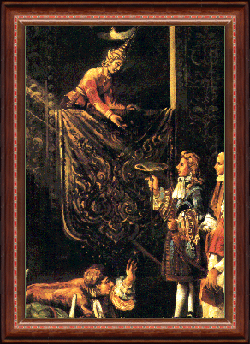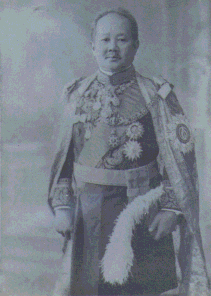วันที่นำเข้าข้อมูล 29 Jul 2020
วันที่ปรับปรุงข้อมูล 30 Nov 2022
Diplomatic History of Thailand


Origin and Development
Under absolute monarchy, the conduct of foreign policy rested entirely in the hands of the all-powerful monarch. Diplomacy in those days was personal in the sense that it was identified with the person of the reigning monarch. According to Thai tradition, King Ramkhamhaeng of Sukhothai (1279-1300) was proficient in the art of cultivating friendly relations. He has been often described as a brilliant diplomat. He established cordial relations with the Emperor of China. Many good-will missions were sent to Peking bearing suitable gifts for presentation to the Chinese court; and Sino-Thai trade soon began to flourish.
Later on, during the reign of King Ramatibodi I (1350-1369), in the early Ayutthaya period, an administrative reform was introduced whereby the whole administrative machinery which had been centralized in the person of the King, was divided into four distinct departments, namely, Wiang (Local government), Wang (Royal Household), Khlang (Treasury) and Na (Agriculture). The conduct of foreign affairs was then entrusted to "Krom Phra Khlang" although the King still retained the conduct of foreign policy.
Early Conduct of Foreign Affairs
Foreign traders began sailing in numbers to Ayutthaya early in the 16th century. As it was the responsibility of "Krom Phra Khlang" to procure needed goods and other materials for the government, and to dispose of its surplus "suai" supplies (contributions in kind in place of personal services to the kingdom), the head of Krom Phra Khlang, widely known as "Phra Khlang" and occasionally referred to as "Berguelang" or "Barcelon" by foreign authors, was brought into direct contact with these traders. Such contact gradually extended to almost all other activities concerning foreigners, including reception of and negotiation with foreign envoys. Thus, as early as 1687, for instance, a commercial treaty with France was signed by Okya Phra Sadet Surendhra Dhibodi, Acting Phra Khlang, and Okphra Sri Phiphat Ratana Rajkosa. Also, the first Thai envoy who was received in audience by King Louis XIV of France at the Court of Versailles was Kosa Pan, a younger brother of Chao Phya Kosadhibodi, Senabodi or Minister of Krom Phra Khlang.
Establishment of Krom Tha
The widening scope of contacts with foreigners eventually necessitated the establishment, late in the Ayutthaya period, of a sub-department under Krom Phra Khlang, called "Krom Tha" , to deal primarily with all port activities. The head of Krom Tha, who assisted Chao Phya Phra Khlang, was given the title of "Phya Phiphat Kosa".
By the time of the Bangkok period (from 1782 on), which coincided with the period of western colonialism, foreign affairs became an increasingly prominent feature of the Kingdom's activities, leading to the conclusion of a series of treaties with foreign powers in the reign of King Mongkut or Rama IV (1851 - 1868) . During that period, a division of responsibilities between Krom Phra Khlang and Krom Tha gradually crystallized. Chao Phya Phra Khlang, although retaining overall control of both departments, was chiefly responsible for the implementation of foreign policy as laid down by the King himself and for negotiation with foreign envoys. He was also entrusted, in co-operation with Krom Wang, with the arrangements for royal audiences and preparation of royal messages to other countries. Krom Tha, on the other hand, was in charge of foreign trade and responsible for the preliminary reception of foreign missions coming to Thailand. As disputes frequently arose among traders, Krom Tha was also empowered to render them justice. A court was set up under each of the three divisions of Krom Tha, namely, the Central Krom Tha Court dealing with cases involving Thai subjects and foreigners; the Left Krom Tha Court dealing with cases among the Chinese; and the Right Krom Tha Court dealing with cases among foreigners other than the Chinese. In addition, Krom Tha was given administrative authority over the seaboard provinces adjacent to the Gulf of Thailand.
Shift of Centre for Foreign Affairs from Krom Phra Khlang to Krom Tha
The principal responsibilities for the conduct of foreign affairs apparently shifted, under King Mongkut, from Krom Phra Klang to Krom Tha, the Chief Administrator of which rose to the rank of Chao Phya. While, during the reigns of King Rama II and King Rama III, it was Chao Phya Phra Khlang who negotiated with John Crawfurd in 1821-22, and Sir James Brooke in 1850, and who concluded treaties with Captain Henry Burney in 1826 and with Edmund Roberts in 1833, there was no representative from Krom Phra Khlang, for instance, in the Thai delegations which signed the treaties with Sir John Bowring of Great Britain in 1855 and with Charles de Montigny of France in 1856. Instead, Chao Phya Thiphakarawong Maha Kosadhibodi, Chief Administrator of Krom Tha, was among the five members of those two Thai delegations. Indeed, in 1869, the second year of King Chulalongkorn's reign, Chao Phya Bhanuwong Maha Kosadhibodi, his successor, was promoted to the position of Senabodi and given additional responsibilities as head of Krom Phra Khlang as well. Krom Tha thereupon assumed the status equivalent to that of a Ministry, and Chao Phya Bhanuwong thus became the first Minister of Foreign Affairs of Thailand.
Separation of Krom Tha from Krom Phra Khlang
Foreign and treasury affairs continued under the same direction until a law was enacted on April 14, 1875, separating Krom Phra Khlang from Krom Tha and making each an independent body. Chao Phya Bhanuwong, nevertheless, remained as Senabodi of Krom Tha and head of Krom Phra Khlang for another ten years. In 1885, he sought and finally obtained the King's permission to be relieved of his post due to ill health, and was succeeded by His Royal Highness Krommuen Devawongse Varopakarn (later promoted the Kromphya).
Prince Devawongse : The Father of Thai Diplomacy
His Royal Highness Prince Devawongse, son of His Majesty King Mongkut (Rama IV), was born in 1858. Having received his education in Bangkok, he began his public service career at the Audit Office in 1875. He concurrently served as Assistant Principal Private Secretary for Foreign Affairs to His Majesty King Chulalongkorn (Rama V.) In 1878 he became the Principal Private Secretary and concurrently Comptroller General in the Treasury.
H.R.H. Prince Devawongse was appointed Minister of Foreign Affairs in 1923 at the age of 66. In recognition of his long and extensive contribution to the Thai diplomatic service the Ministry of Foreign Affairs subsequently accorded him the title "Father of Thai Diplomacy
  |
| H.R.H. Prince Devawongse Father of Thai Diplomacy |
Reorganizations of the Ministry of Foreign Affairs
Under Prince Devawongse Varopakarn, and before gaining the legal status of a Ministry, Krom Tha Office was divided into five divisions, namely, Senabodi Division, Accounts Division, Filing Division, Diplomatic Division, and Consular Division. As a division chief was then called "Chao Krom" or " Athibodi", these divisions might be considered abroad were directly answerable to the Senabodi himself.
Three new divisions were subsequently added. They were Under-Secretary Division, Translation Division, and Reception Division. But the Diplomatic and Consular Divisions were combined into one, thus making a total of seven divisions. Later, there was a return to the original five divisions but the Under-Secretary Division was retained. In 1910, the Ministry under went a third reorganization, whereby the Senabodi and Under-Secretary Divisions were merged into a new Command Division, performing functions similar to those of the present Office of the Secretary to the Minister. The former Translation Division was revived, and a new General Counsel Division was created. After the First World War, a League of Nations Section was also established to deal with the activities of that world body.
In 1927, two Departments-Political and Prakasit (Protocol) were set up under the Ministry to assume the functions of the various divisions already described. From 1933 to 1942, several reorganisations were introduced, based on the nature and the varying scope of activities being then undertaken by the Ministry. Thus, in 1942 there were the Office of the Secretary to the Minister, the Office of the Under-Secretary of State, the Office of the Adviser, the Eastern Political Department, the Western Political Department, the Protocol Department, and the Economic Department.
Again, a series of reorganisations, both major and minor, took place in 1950, 1952, 1953, 1956, 1960, 1963, 1970 and 1971.
In 1992, the Political Department was reorganized into 4 regional departments, an arrangement which continues to the present.
Office Hours : Monday - Friday, 08.30 - 16.30
(Except public and offcial holidays)![]()
This website had been designed to be as accessible as possible to all and is certified by the WCAG 2.0 standard (Level AA)
** ![]() Best viewed with Chrome Version 76 up **
Best viewed with Chrome Version 76 up **
Home
Thailand and ASEAN
Media Center
Ministry of Foreign Affairs
Foreign Policy
Information for Visitors to Thailand
Consular Services
Thailand Now
Diplomatic Corps
Ministry of Foreign Affairs Sri Ayudhya Road, Bangkok 10400 Thailand Tel. 0-2203-5000 Thailand.